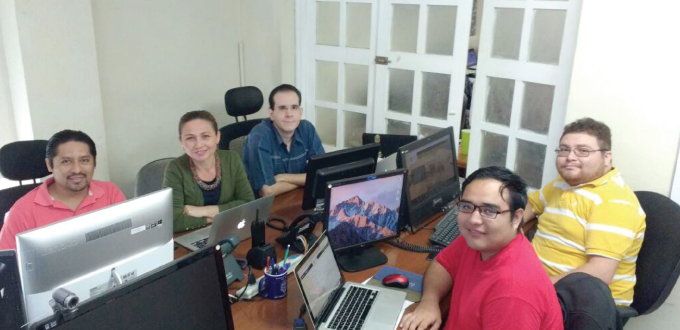IPv6 Challenge: The Challenge of Leading Change from a University
30/11/2017

Universidad Autónoma de Yucatán (UADY) of Mexico won the second edition of the IPv6 Challenge organized by the Latin American IPv6 Forum and LACNIC’s R&D department.
The IPv6 Challenge is a LACNIC initiative aimed at encouraging and promoting the use of this protocol in Latin America and the Caribbean.
Different organizations and companies which have implemented IPv6 in their Latin American and Caribbean networks participated in the second edition of the challenge and presented the work they have completed with this Internet protocol.
This time, the winning team was that of Felipe Mijangos Manrique, Carlos Rico Blanco and Enrique Solís Pomar, coordinated by Emmanuel Serrano Piña and Carmen Denis Polanco, all of them representing UADY.
Carmen Denis Polanco told LACNIC News that the IPv6 Challenge had allowed them to address internal challenges to lead the process of IPv6 adoption and deployment in the University’s network, ensuring the availability of the infrastructure needed for Internet development.
What drove you to participate in the IPv6 Challenge?
There were several reasons that prompted us —the UADY— to participate in the IPv6 Challenge, among them the opportunity contribute our progress in benefit of Mexico and the Latin American and Caribbean region, motivating UADY and raising awareness on the importance of IPv6 deployment, and laying the groundwork within the UADY to guarantee future Internet development and support for new technologies.
What challenges did you encounter during the process?
We faced several challenges, from convincing the university’s top management to approve the financial resources needed to obtain the IPv6 block from IAR Mexico, to the lack of prior training of members of the IT team assigned to participate in the challenge. However, although they had to continue with their responsibilities in providing support and other IT services for the university network, they were more than willing to contribute and were able to complete this important task.
What progress has your university achieved in terms of IPv6 implementation?
As a University, progress was made in that we requested the IPv6 block from IAR Mexico, signing the corresponding contract in October. Likewise, we developed the plan for implementing IPv6 in the university network. Finally, the current knowledge base was also expanded, as configuration guides and instructions were developed based on the results obtained at the testing laboratory set up at UADY for the IPv6 challenge, which will serve as the basis for implementing the deployment plan.
Do you think organizations are aware of the need to deploy IPv6 or do they still see this as something to be dealt with the distant future?
It is a reality that educational institutions such as universities are being slow in adopting the IPv6 protocol, at least in Mexico, compared to other institutions in Latin America and the Caribbean. This contrasts with the situation 25 years ago when universities were spearheading Internet development. Today we are facing much more complex challenges in defining the short-term future of the Internet, and universities are becoming aware of the need and importance of working hard towards IPv6 deployment and of evolving so that we will be able to apply best practices for the proper operation of BGP/RPKI and the security ecosystem.
What can you tell us about the internal process that led your university to decide to move forward with IPv6 deployment?
The university is aware of the need to be at the forefront of innovative information technology processes and services in line with the Digital Agenda of the Dean of UADY, as this benefits the university community and the whole of society in southeast Mexico. Therefore, as part of the strategy to revamp the university network to prepare ourselves for the new challenges the Internet will face in an increasingly near future, the following actions are being carried out aimed at IPv6 deployment: laboratory testing conducted prior to the release of configuration schemes on the university network and IT services; providing continuity to the project for improving network connectivity, including the renewal of communications infrastructure and equipment to consider IPv6 compatibility; adoption and deployment of IPv6 in the cloud; creation of a working group for IPv6 deployment at UADY, which will comprise the IT managers who administer the network and services in each UADY school and facility.
What are the main difficulties when discussing IPv6 implementation?
The difficulties include a lack of IT staff, coupled with the constant increase in the demand for the provision of IT services for the university community, which limits the time available for innovation and new projects, the idealization of transition mechanisms for switching from IPv4 to IPv6, a process for updating infrastructure technology so that it will support the v6 protocol, and resources for the acquisition of this infrastructure.
(Free access, no subscription required)